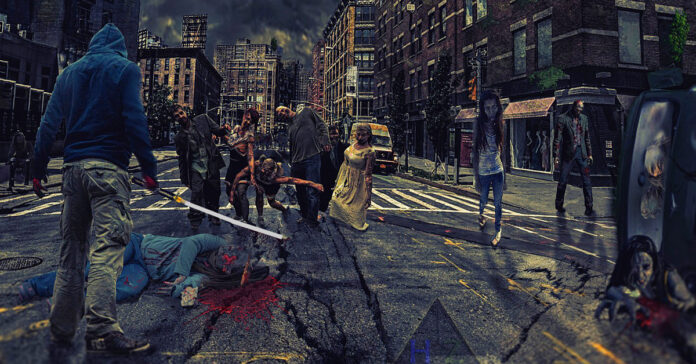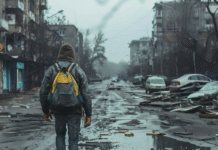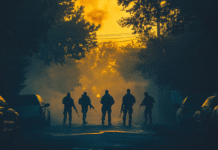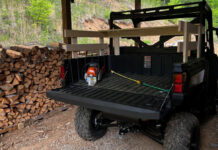I watched a couple of episodes of Black Summer on Netflix the other day. It didn’t seem all that different from the Walking Dead, of which I have seen a few early episodes.
I don’t get the attraction of TV shows in which a few people struggle to combat the zombies which chase them all over the neighborhood, the country, or perhaps even the world. It also annoys me that so many people don’t have lots of guns and lots of ammo. If I’m in a neighborhood where a zombie outbreak takes place, I’m strapping on two or three Glocks and as many magazines as I can carry. Then I’m loading up the 12-gauge semi-auto and a bandolier or belt loaded with 00 buck. If I am stupid enough to leave my barricaded retreat and take a car somewhere in the middle of a ZA, I’m filling it with ammo cans and back up guns.
Fun with Zombies
I’ve also watched both Zombieland movies. At least they used guns and had the added bonus of being funny.
I admittedly enjoyed killing zombies in round after round of the old Call of Duty Black Ops video games I played with my kids, but I never considered it training, mostly because we don’t have a teleporter, power-ups, and we can’t respawn. Still, that’s about the most fun I’ve had with zombies.
Speaking of fun, I’ve also read most of the Black Tide series by John Ringo, not so much for the zombies as for Ringo, who is an author I enjoy. Sure, he can be over the top, but that’s part of the fun. It doesn’t hurt that he pokes fun at the FBI and government officials. You get the idea that he doesn’t take anything too seriously, including zombies.
Let’s leave the make-believe world of TV, movies and video games behind and keep in mind that no serious survivalist prepares because they expect the country to be overrun by zombies.
Preppers and Zombies
Survivalist originally used the term “zombies” because it was more socially acceptable to talk about killing zombies than killing people. Wikipedia credits this to James Wesley, Rawles, of Survival Blog. I knew he started using the phrase “golden horde,” but I wasn’t aware he was the first to use the term “zombies” in a survival sense. Both refer to the large number of ill-prepared who are expected to abandon the cities and head to the country when the SHTF. Hardcore survivalist look on the golden horde, or zombie horde, like a farmer looks upon a cloud of grasshoppers: something that will strip them bare if not exterminated.
The CDC jumped on the zombie bandwagon in 2011 when it posted a blog titled “Preparedness 101: Zombie Apocalypse.” The blog post attracted so much attention, it crashed the CDC website. At that point, survival and zombies became part of the popular culture.
Today, the terms zombie and the zombie apocalypse (ZA) are used either as a joke or as a short-hand way of saying you are prepared for anything. I don’t use the term very often on this blog because I think you should get used to the idea that in a serious SHTF situation you might have to kill people who are trying to kill you. Thinking of them as zombies may make killing people more emotionally palatable, but thinking of them as shambling idiots who don’t shoot back and have no tactical skills is going to get you killed. Better to think of them as enemy combatants.
Today, companies make “zombie killer” ammo. I’d say they’ve jumped the shark with this whole zombie thing. I’d like to see it fade away because we’ve got enough genuine threats to prepare for.
Zombies Pre-Date Preppers
The modern, hard-to-kill, flesh-eating zombies date back to at least 1968’s Night of the Living Dead, a horror movie directed by George Romero. Zombies in movies have continued to evolve ever since, often getting faster or deadlier.
The undead have a history that dates back centuries and includes vampires, shapeshifters, and other beasts. Legend has it the undead can be killed by a silver bullet, which is why we have the silver bullet cliché. Today, it often takes a headshot to kill a zombie. I’m going to continue to follow my training and shoot any enemy combatants in the center of mass until the threat ceases. If my rounds are ineffective, then I will move my point of aim up or down to avoid their body armor.
The Science of Zombies
Let’s be real: there is no science of zombies because they don’t exist outside of our imagination and that of storytellers and entertainers. The aforementioned John Ringo made a good try at making a scientific explanation, creating a virus that looked like a modified version of rabies. In his books, the disease starts with flu-like symptoms. After a week or ten days, the neurological symptoms set in. These cause the infected to itch, which makes them remove their clothes. Then they turn into rabid carnivores with “extreme homicidal psychosis” and try to eat anything that is alive or makes noise, including each other. When they bite someone, the victim gets infected and starts acting like zombies in anywhere from minutes to hours.
This is the part where people will say the Chinese could invent such a virus, or a meteor, or some alien technology might introduce it on earth, or whatever. Fine. Believe whatever science fiction you want. I prefer to prep for likely emergencies instead of the unlikely. For example, I live thousands of feet up a mountain and hundreds of miles from the shore, so I’m not preparing for a tidal wave. If I lived in the Florida Keys, I would prep for hurricanes, but not blizzards. In neither case would I prepare for zombies. But if preparing for zombies is what it takes to motivate you, your spouse, or your children, then be my guest. If you have to gamify prepping to get someone on board, then go for it.
The Real Threats
In a world of invasions, war, global nuclear threats, crashing financial systems, oil shortages, rising crime, leaders who repeatedly violate your rights, and an oncoming depression, why worry about imaginary disasters?
I think I’m going to use some of those pumpkins we’ve been feeding our chickens to practice headshots. You know. Just in case.







